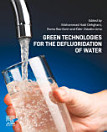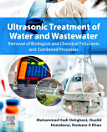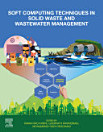Innovative Remediation Technologies for Micro- and Nanoplastics in Water and Wastewater
About this ebook
About the author
Prof. Dr. Mohammad Hadi Dehghani is a full professor at the Tehran University of Medical Sciences (TUMS), School of Public Health, Department of Environmental Health Engineering, Tehran, Islamic Republic of Iran. His scientific research interests include environmental science. He is the author of various research studies published in national and international journals and conference proceedings and head of several research projects at the TUMS. He has authored 20 books, 26 book chapters and more than 270 full papers published in peer-reviewed journals. He is an editorial board member, guest editor, and reviewer in many internal and international journals and a member of several international science committees worldwide. He also has the distinction of being listed in the top 2% of the world’s most influential scientists in the area of environmental sciences. He is a supervisor and advisor for many PhD and MSc theses at the TUMS. He is currently also a member of the Iranian Association of Environmental Health (IAEH) and member of the Institute for Environmental Research (IER) at the TUMS. He is an editor for 14 edited books (English): (1) Soft Computing Techniques in Solid Waste and Wastewater Management, (2) Environmental and Health Management of Novel Coronavirus Disease (COVID-19), (3) Green Technologies for the Defluoridation of Water, (4) Pesticide Remediation Technologies From Water and Wastewater, (5) COVID-19 and Sustainable Development Goals, (6) Industrial Wastewater Treatment: Emerging Technologies for Sustainability, (7) Sustainable Materials for Sensing and Remediation of Noxious Pollutants, (8) Wastewater-Based Epidemiology for the Assessment of Human Exposure to Environmental Pollutants, (9) Water Treatment Using Engineered Carbon Nanotubes, (10) Water, the Environment and the Sustainable Development Goals, (11) Sustainable Remediation Technologies for Emerging Pollutants in Aqueous Environment, (12) Health and Environmental Effects of Ambient Air Pollution, (13) Health Effects of Indoor Air Pollution, (14) Diseases Attributed to Air Pollution.
Dr. Mina Aghaei is a faculty member at the School of Public Health, Tehran University of Medical Sciences, and a dedicated researcher in the field of Environmental Health and Human Ecology. Her expertise lies in emerging pollutants, with a focus on their health risks, environmental impacts, and sustainable solutions. She is the author of various research studies published in national and international journals and has led several research projects at TUMS. Dr. Aghaei focuses on understanding the health risks associated with these pollutants, addressing their growing prevalence and potential impacts on human health. She is deeply involved in systematic reviews and meta-analyses to provide a comprehensive overview of the effects of emerging pollutants on human health. As an active contributor to the academic community, Dr. Aghaei serves as Co-Editor and Section Editor for the Journal of Environmental Health Science & Engineering (Springer).
Parnia Bashardoust is a faculty member at the School of Public Health, Tehran University of Medical Sciences (TUMS). Her research focuses on critical areas of environment, including water pollution and wastewater, emerging and micro-pollutants, waste management, and environmental pollution and remediation. She is an active peer reviewer for several high-impact journals in the field of environmental science, contributing to the advancement of scholarly discourse. With a robust publication record, she has authored numerous research articles in both national and international journals. Additionally, she has played a key role in collaborative research initiatives at TUMS, furthering innovation and knowledge in her areas of expertise.





